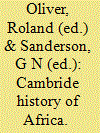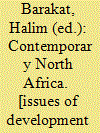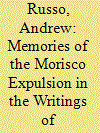| Srl | Item |
| 1 |
ID:
027780


|
|
|
|
|
| Publication |
Cambridge, Cambridge University Press, 1985.
|
| Description |
xvi, 956p.: mapshbk
|
| Contents |
Vol. VI: From 1870 to 1905
|
| Standard Number |
0521228034
|
|
|
|
|
|
|
|
|
|
|
|
Copies: C:1/I:0,R:0,Q:0
Circulation
| Accession# | Call# | Current Location | Status | Policy | Location |
| 028111 | 960/OLI 028111 | Main | On Shelf | General | |
|
|
|
|
| 2 |
ID:
045508


|
|
|
|
|
| Publication |
Cambridge, Cambridge University Press, 1986.
|
| Description |
xx, 1063p.: maps, figures, tableshbk
|
| Contents |
Vol. VII: From 1905 to 1940
|
| Standard Number |
0521225051
|
|
|
|
|
|
|
|
|
|
|
|
Copies: C:1/I:0,R:0,Q:0
Circulation
| Accession# | Call# | Current Location | Status | Policy | Location |
| 028110 | 960/ROB 028110 | Main | On Shelf | General | |
|
|
|
|
| 3 |
ID:
029807


|
|
|
|
|
| Publication |
London, Croom Helm, 1985.
|
| Description |
271p.hbk
|
| Standard Number |
0709934351
|
|
|
|
|
|
|
|
|
|
|
|
Copies: C:1/I:0,R:0,Q:0
Circulation
| Accession# | Call# | Current Location | Status | Policy | Location |
| 027378 | 961.04/BAR 027378 | Main | On Shelf | General | |
|
|
|
|
| 4 |
ID:
181093


|
|
|
|
|
| Summary/Abstract |
This paper aims to clarify the scope and limitations of the ideals of Pan-Maghrib nationalism as developed by the Association of North African Muslim Students in France (AEMNAF) in the 1930s. The AEMNAF members’ inclination toward sciences and technology and their emphasis on conserving their mother culture made them consider Arabism and Islam their most important identity markers. Moreover, the AEMNAF created a sense of solidarity among Maghribi students in France and extended its social influence by cooperating with French and Mashriqi opinion leaders in Europe. However, the AEMNAF's narrow definition of Muslim-ness and its elitist nature led to the exclusion of Maghribis with French citizenship from the organization. The dualistic view of technology and culture in Maghribi nationalist thought also contributed to prioritizing Francophones over Arabophones, Muslims over non-Muslims, men over women, and students in the sciences over those in humanities.
|
|
|
|
|
|
|
|
|
|
|
|
|
|
|
|
| 5 |
ID:
188442


|
|
|
|
|
| Summary/Abstract |
The Morisco expulsion of 1609–1614, enacted during the reign of Philip III, left tens of thousands deserted in foreign lands and uncertain of their futures. The vast majority of those expelled ended up in Tūnis. There a small circle of educated and respected leaders among the Moriscos sought to integrate their fellows into Maghribī life through the cultivation of friendships with prestigious leaders in Tūnis and by producing writings that were meant not only to demonstrate the dignity and nobility of the Moriscos but also to show their coherence as a distinctive people with a common origin that is rooted in the history of al-Andalus. To that end, Muḥammad Ibn ʿAbd al-Rafīʿ, an émigré from Murcia, composed Al-Anwār al-Nabawiyya fī Abā Khayr al-Barriyya (“The Prophetic Lights on the Fathers in the Best Land”), a manuscript that was meant to meet concerns over the Morisco presence in the Maghrib by invoking memories of al-Andalus and Granada. The analytic tools of memory studies thus allow one to see the extent to which memories of al-Andalus were creatively conceptualized and employed to create space for the Moriscos within Andalusī history and Maghribī society.
|
|
|
|
|
|
|
|
|
|
|
|
|
|
|
|